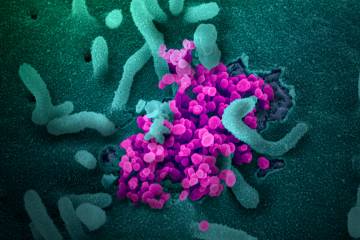Two weeks ago, online retailers sold out of the over-the-counter heartburn medication famotidine after reports circulated that it was the subject of a clinical trial as a treatment for COVID-19, according to The Washington Post. Frantic shoppers emptied pharmacy shelves in brick-and-mortar stores, and CVS and Walgreens are working to refill their supply.
It's the latest example of Americans stockpiling medications after the rise of unsubstantiated claims that these drugs treat or protect against the coronavirus.
Experts estimate a viable COVID-19 vaccine is still many months away. In the meantime, the pharmaceutical supply chain is threatened by profound disruptions caused by hoarding, pharmacy closures, and surges in demand for medicines to treat critical illness, among other problems.
In an editorial published in JAMA in early April, Johns Hopkins epidemiologist Caleb Alexander and Dima Qato from the University of Illinois at Chicago outlined strategies for shoring up U.S. drug supplies to ensure those who require medicines are able to access them.
"This pandemic is probably the biggest stress test that one can imagine on the pharmaceutical supply chain," says Alexander, a professor of epidemiology and medicine at the Johns Hopkins Bloomberg School of Public Health and the School of Medicine. He is also the co-director of the Johns Hopkins Center for Drug Safety and Effectiveness.
Tens of millions of Americans take some form of daily medication, he says, and though the industry has mobilized to protect access to these drugs, the lack of a centralized list of essential medicines and an overreliance on international pharmaceutical suppliers contribute to key vulnerabilities in the U.S. drug supply chain that must be addressed, not only to meet the urgent needs of the public during the pandemic, but to protect the health of the population in the future.
"This pandemic is an opportunity to ensure that these individuals not only have access to the medicines they need today but also tomorrow and during the next national emergency," Alexander says.
The strategies outlined by Alexander and Qato are:
Develop an essential medications strategy. The Food and Drug Administration should develop a list of essential drugs—such as antivirals, antibiotics, cardiovascular drugs, analgesics, and contraceptives, Alexander says—and all government preparedness departments, including those at the federal, state, and local level should have an adequate and affordable supply of those drugs.
Finance an emergency supply of essential medicines. In recent weeks, insurers have relaxed refill restrictions, allowing customers to purchase their medications outside their typical refill windows. These actions, however, have only benefited those customers who have the financial means to purchase their drugs in advance, further marginalizing the economically disadvantaged. The authors write that insurers must help finance these drug purchases during health emergencies to make advance purchases more accessible.
Prevent stockpiling and drug shortages. Wholesalers should develop and adhere to an allocation strategy for specific medicines to prevent shortages after a surge in demand. These allocation strategies can include restrictions to 30-day supplies during purchasing.
Expand capacity for mail-order and home delivery of drugs. Under the current federal guidance for social distancing, the ability to rapidly scale up home delivery and mail-order drug delivery is essential, Alexander says.
Implement a long-term strategy to safeguard access to medicines. The authors recommend increasing the domestic production of essential medicines in order to protect the supply chain during international public health crises. "In some cases, we're overly reliant on single countries to provide pharmaceutical ingredients, and anything that disrupts trade or the shipment of those ingredients can jeopardize the medicine supply in the United States," Alexander says. "In this case, a diversified supply chain is a sound supply chain."
While the coronavirus pandemic has laid bare the system's limitations and vulnerabilities, Qato and Alexander write in the paper that the willingness of regulators, manufacturers, and distributors to adapt their operations to meet the urgent needs of at-risk individuals means that it is possible for the pharmaceutical industry to evolve to overcome these systemic supply chain challenges. "Despite this," they write, "there is more work to do, and not a moment to lose."
Posted in Health
Tagged prescription drugs, coronavirus, drug safety










